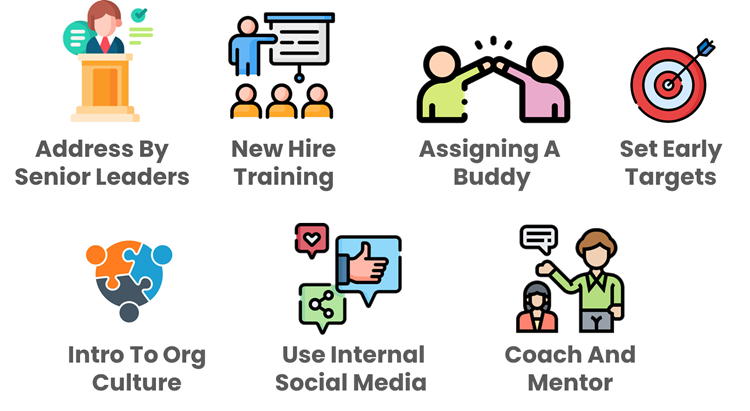7 essential strategies to engage your new hires from Day One — accelerate their connection to purpose, culture, and performance.
1. Facilitate Early Leadership Interaction: A welcome address by senior leaders helps new hires understand the organization’s vision and strengthens their connection with the company from the start.
2. Provide Structured Onboarding and Training: Conduct phased training programs to gradually introduce new hires to the organization’s operations, culture, and processes, preventing information overload.
3. Assign Buddies for Support and Social Integration: The buddy system provides new hires with a go-to person for guidance and social integration, improving early performance and retention.
4. Set Achievable Early Goals and Offer Continuous Mentorship: Setting clear, realistic early goals and providing coaching and mentorship help new hires build confidence, understand expectations, and stay motivated.
Hiring has always been a challenging task for any organization, regardless of its size. Another challenge is getting new hires to ‘hit the ground running’ and become familiar with the organization’s work environment, workflow processes, and culture.
There are several steps that organizations must take to engage their new hires.
The biggest impact on the success of new employees is how their mangers engage with them during their first few days.
Research shows that systematic onboarding of new hires can increase their efficiency and effectiveness by nearly 60%.

It, in turn, reduces failure rates and retention. Thus, it is in the organization’s best interest to get new hires to become productive quickly and stay with the organization.
When onboarding is well-executed, it sets the foundation for long-term success.
Here are a few best practices to ensure that new employees remain enthusiastic, engaged, and informed about their new workplace:
1. Welcome Address By Senior Leaders
2. New Hire Training
3. Assigning A Buddy
4. Set Early Win Targets
5. Introduction To Organizational Culture
6. Engage Using Internal And External Social Media
7. Coach And Mentor Them


Senior leaders play a crucial role in engaging employees.
Thus, when the leaders welcome the new hires, they can get a good understanding of their vision. It is the leaders who represent the organization.
Without leadership involvement, their chances of engaging with the organization are limited.
Hence, interaction with senior leaders during onboarding can strengthen the connection between the organization and the new joiners.

Training new employees on the organization’s business and operations is essential.
However, cramming all details in a limited time frame might not be a good idea. New employees may struggle to absorb the overload of information.
Hence, it is a good idea to conduct the new hire training in a phased manner to bring new employees up to speed.
The induction process can last weeks, helping new employees become more aware of various aspects of the organization.

The buddy system can be a key component of an effective onboarding program.
It can provide new employees with a reliable, motivated, ongoing, single point of contact for questions regarding work processes.
A buddy partners with a new employee during his or her first few months of employment. He or she is a colleague assigned to assist the new hire to get through the first nerve-wracking period,
They can help new employees understand how things work within the organization, such as ordering office supplies and making travel arrangements, and involve them in social or informal activities, like lunch and coffee.
This socialization and support can make an enormous, positive difference in early performance, social integration, and long-term retention.

Another powerful strategy to enhance new employees’ productivity is to provide them with clear, achievable goals.
Rather than setting formal goals for new hires initially, supervisors should set clear, realistic expectations for the next few months, that he or she is confident that the new employees can achieve.
It will give both the supervisor and the employee confidence. It will also help increase the new employee’s motivation to take on even more significant challenges.
Supervisors should discuss performance gaps and how to mitigate them, setting the new hire up for future success.

A new hire may not be familiar with the organization’s culture, language, and tone.
If new hires are not familiar with the organization’s terminology and jargon, they will continue to feel like outsiders.
Thus, the corporate buzzwords, acronyms, language, insider jokes, culture, and traditions of the organization should be well explained to them.
The buddy system and regular participation in both formal and informal team meetings and gatherings can be beneficial.
It would make newly joined employees feel more comfortable and accelerate their integration into the organization’s culture.

Once the new hire is on board, the organization should invite them to its internal social media.
It could include MS Teams communities, Yammer groups, WhatsApp groups, Facebook pages, LinkedIn pages, Twitter handles, Instagram accounts, and other social media platforms.
Hence, keeping them connected with the happenings can be one of the effective ways of getting them immersed in the organization’s culture.

According to a Gallup Q12 study, knowing “what is expected of me” is one of the most critical questions contributing to employee satisfaction.
New employees face a steep learning curve when they start with a new organization.
Supervisors should take time from their busy schedules to coach new employees whenever they see them struggling with any task.
The attention of their supervisors also increases the new employee’s level of engagement.
Undoubtedly, employee engagement is one of the critical success factors for driving business growth in organizations today.
Hence, ensuring a high level of passion and commitment from new hires towards their work and the organization, as early as possible in their tenure is of paramount importance.
Organizations need to engage their new hires in several ways.

Lead author: Sagar Chaudhuri, the Co-Founder and CEO of HiFives. He is an HR Tech Evangelist with over 25 years of experience in both corporate and entrepreneurial settings. Previously, Sagar has held leadership roles at companies such as Genpact, Infosys, and ICICI Bank. He has an engineering degree from IIT Kharagpur and an MBA from IIM Lucknow. Connect on LinkedIn
To stay updated on the latest HiFives blogs, follow us on Twitter (@MyHiFives)